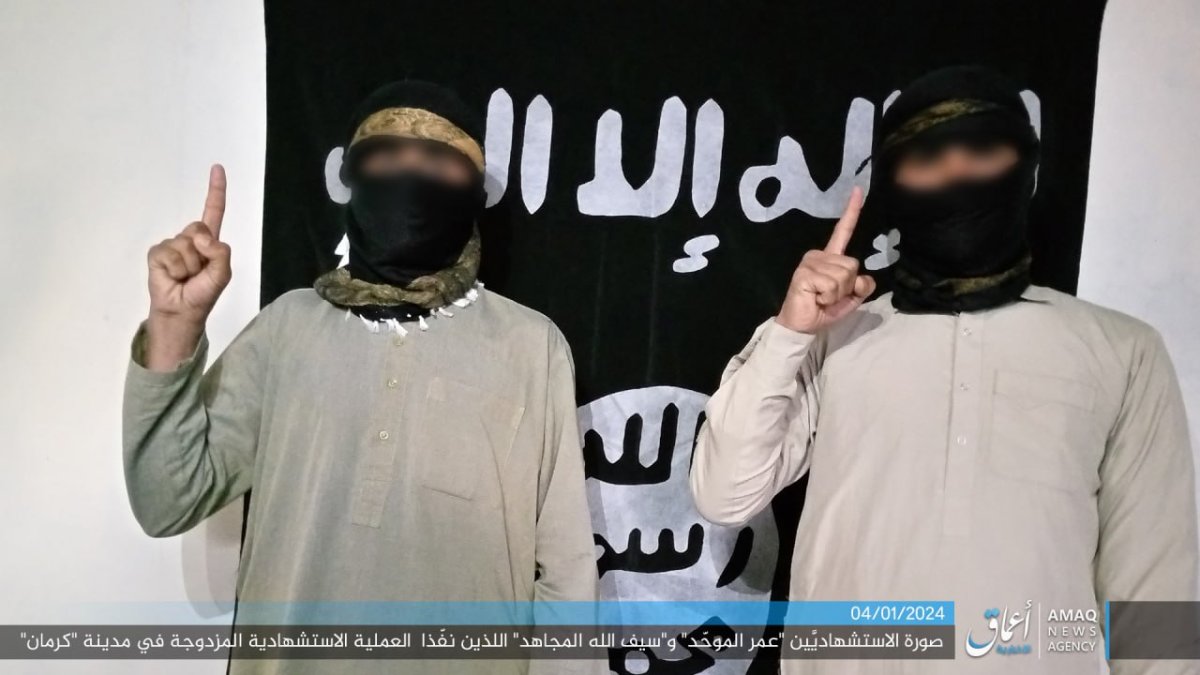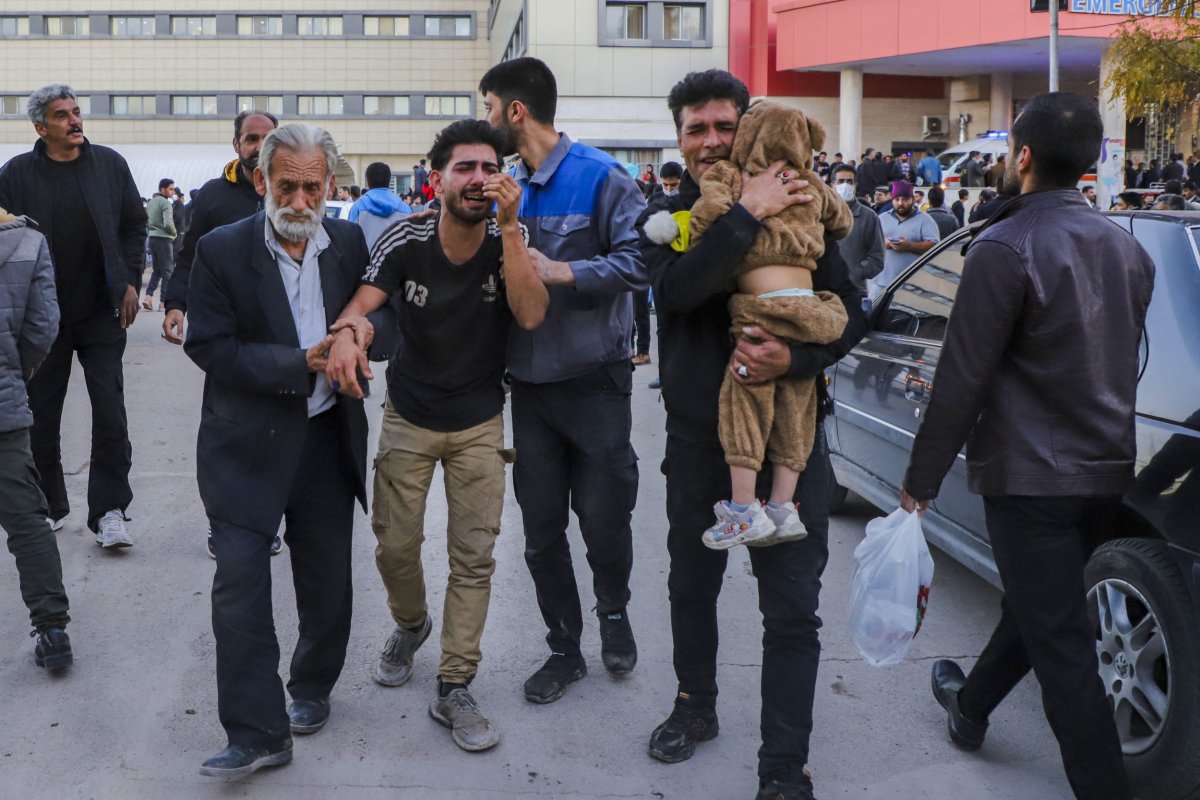The Islamic State militant group (ISIS) has claimed responsibility for the deadliest attack in Iran since the 1979 Islamic Revolution, marking yet another potentially destabilizing front in a region already in the throes of deepening conflict.
In a statement issued Thursday by official ISIS channels, the group said two of its members, Omar al-Muwahid and Saifallah al-Mujahid, "set off towards a large gathering of polytheist Shiites near the grave of their dead leader 'Qassem Soleimani' in the city of Kerman, south of Iran, yesterday, where they detonated their explosive belts in the middle of the crowd, killing more than 300 polytheist Shiites, and all praise and gratitude be to God."
"Let the polytheist Shiites know that the mujahideen are waiting for them and their projects, God almighty willing," the statement added.
A follow-up report issued by ISIS' Amaq News Agency included an image of two masked men in front of the group's flag and asserted that Soleimani had been "involved in dozens of massacres of Muslims in Iraq and Syria."

The death toll provided by Iranian emergency services as of Thursday was 84, lower than initial estimates exceeding 100, with hundreds more reportedly wounded. The attack occurred on the fourth anniversary of the U.S. killing of Soleimani, then commander of the elite Islamic Revolutionary Guard Corps Quds Force, and appeared to target a procession of those mourning him near his burial site in Kerman.
Iranian officials did not identify any specific perpetrators in their initial condemnations of what they referred to as "terrorist attacks," nor in their strongly worded vows for revenge. They did, however, frequently tie them to attempts by "Zionists" to stir up unrest in the Islamic Republic amid the ongoing war between Israel and the Palestinian Hamas movement in Gaza.
Newsweek has reached out to the Iranian Mission to the United Nations for comment.
Iran has been a staunch supporter of Hamas and other Palestinian factions battling Israel, while ISIS has criticized fellow Sunni Muslim Hamas, Shiite Muslim Iran, Jewish Israel and all other factions deemed heretical to the jihadi group's ultraconservative interpretation of Islam.
In a separate audio statement issued earlier Thursday, ISIS spokesperson Abu Hudhaifa al-Ansari called on Muslims across the globe to launch attacks on Jews and Christians. He also called for attacks against Shiite Muslims and accused Hamas of having committed a "sin" by allying with Tehran.
Soleimani played a frontline role in mobilizing efforts to battle ISIS in Iraq and Syria, though his critics have accused him of exploiting sectarian tensions in doing so. The famed yet controversial Iranian military leader helped to establish a network of partnerships known as the "Axis of Resistance" that became increasingly active against U.S. troops after the defeat of ISIS' self-styled "caliphate" in 2019.
A worsening cycle of tensions that year ultimately culminated in then-U.S. President Donald Trump ordering his killing in a strike targeting his convoy at Baghdad International Airport in January 2020. The strike came just months after Trump approved a U.S. Special Operations Forces raid that led to the death of ISIS' first leader, Abu Bakr al-Baghdadi, in rebel-held northwestern Syria in October 2019.
Iran, for its part, has faced a history of attacks from militant groups, including at least two high-profile operations claimed by ISIS in 2017 and 2022, as well as an array of other dissident and ethnic separatist-tied operations over the decades of the Islamic Republic's history.
In his letter issued Wednesday to U.N. Security Council President Nicolas de Rivière and U.N. Secretary-General António Guterres, Iranian Permanent Representative to the U.N. Amir Saeid Iravani said Iran "is committed to leveraging all available mechanisms to ensure accountability for those responsible and their accomplices in this heinous terrorist act."
He asserted that "the Islamic Republic of Iran unequivocally condemns such abhorrent acts of terrorism and remains steadfast in the pursuit of justice for the victims" and "as one of the primary victims of terrorism and having directly experienced its catastrophic consequences, the Islamic Republic of Iran remains steadfast in its unwavering commitment to leading the fight against this scourge."

While ISIS has continued to expand its reach across Africa, mount bold operations in Taliban-led Afghanistan and operate sporadically across the Middle East and other parts of the globe, the attack on Iran marks one of the group's most devastating attacks in years.
The attack comes at a time of heightened tensions across the region as a result of the ongoing war in Gaza, which has drawn an array of Iran-aligned actors striking at Israel and its allies, as well as the U.S., which has sought to deter a widening war while at the same time going after attacks against its troops by militias in Iraq and Syria and operations against commercial ships by Ansar Allah, also known as the Houthi movement, off the coast of Yemen.
While the Israel Defense Forces (IDF) would neither confirm nor deny its role in the deadly attack in Iran when asked by Newsweek, U.S. officials sought to distance Washington and its ally from the explosion. One senior official of President Joe Biden's administration suggested during a press call Wednesday that the attack more closely fit the modus operandi of ISIS.
"I think just based on the MO it does look like a terrorist attack," the senior administration official said. "It's the type of thing we've seen ISIS do in the past. And as far as we're aware, that's kind of, I think, our going assumption at the moment."
The following day, after ISIS issued its claim, U.S. State Department spokesperson Matthew Miller also said "this attack does bear all the hallmarks of an ISIS attack."
Speaking at a White House press conference that same day, National Security Council Strategic Communications Coordinator John Kirby said the U.S. "is in no position to doubt" the jihadis' claim to the attack.
Update 1/4/24, 8:48 p.m. ET: This story was updated with additional information.
Uncommon Knowledge
Newsweek is committed to challenging conventional wisdom and finding connections in the search for common ground.
Newsweek is committed to challenging conventional wisdom and finding connections in the search for common ground.
fairness meter
To Rate This Article
About the writer
Based in his hometown of Staten Island, New York City, Tom O'Connor is an award-winning Senior Writer of Foreign Policy ... Read more
To read how Newsweek uses AI as a newsroom tool, Click here.








